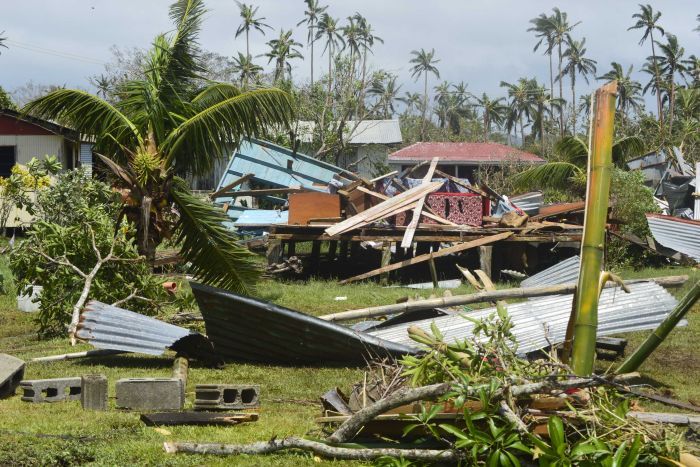Can you cut 1 Tonne of carbon pollution out of your life?
Take the challengeWritten by Kristen Jeffrey
In Fiji tonight many mothers are putting their children to sleep under roofless, blown apart buildings that up until very recently were their homes. Many families now have no possessions but the clothes on their backs and what they could grab before the full force of Cyclone Winston hit on Saturday. These families are hiding out
Nowhere in the world is more at risk from the direct effects of climate change than the island nations of the pacific.
Read more: Island nation Kirabati has purchased land on Fiji in preparation for rising sea levels
It's unsurprising that Fiji was the first country to formally approve the UN climate deal in Paris. Pledging to move 100% of its electricity generation to renewable sources by 2030. Fiji's Prime Minister, Voreqe Bainimarama said, "tackling climate change was a major priority for the archipelago, which could face wide-scale flooding, fiercer tropical storms, and depleting fish stocks as a result of the world's changing climate".

Image: ABC News
In 2010 a team of scientists began research into behavior patterns of tropical cyclones and their link to climate change. They found that their future projection models "consistently indicate that greenhouse warming will cause the globally averaged intensity of tropical cyclones to shift towards stronger storms, with intensity increases of 2-11% by 2100".
Fiji, being an island in the South Pacific lies vulnerable to not only hurricane season but also the affects of both El Niño and La Niña. These are naturally occurring climate patterns, but as the climate changes aspects of weather experienced in some regions during the El Niño and La Niña events are producing more severe weather patterns.
Watch: The El Niño explained
For example, if El Niño tends to warm a particular region now, then temperatures experienced during future El Niño events may be higher than those experienced during past El Niño events.
On Saturday, Tropical Cyclone Winston was ranked the strongest land-falling tropical cyclone on record in the South Pacific archipelago. According to Colorado State University tropical scientist, Dr. Phil Klotzbach, it was the first Category 5 tropical cyclone to hit Fiji and the strongest tropical cyclone of record in the Southern Hemisphere by maximum winds, peaking 185 mph. Although it is unproven whether cyclones draw a direct link to climate change, current evidence suggests that warming does increase hurricane intensity.
Watch: Weather vs Climate Change Explained by Neil DeGrasse Tyson and His Dog
Weather patterns continue each year to change from their historical norms. Scientists are recording events of greater and greater intensity; records are being broken and the evidence of the effect humans are having on the climate of the world is mounting. In Fiji's case there has been an averaged rise of 6 mm per year since 1993. Where rising sea levels are a known effect from climate change so too are warming sea-surface temperatures. We will continue to see displacement from the rising tide, families losing homes and Livelihoods to hungry oceans. Creating an especially big burden on women and their safety.
Read more: Why climate change is a women's fight
Pacific countries like Fiji are at huge risk from extreme weather events and while we cannot answer for certain if the warming of the planet connects to a more frequent occurrence of cyclones, what we can say is that the warmer than average water that is being recorded in the South Pacific helped fuel the devastating Cyclone Winton.
What you can do to help
I am a development worker working in the Fijian Dawasamu District, helping communities to challenge their hygiene and sanitation practices. Where these communities are learning to break away from basic hygiene practices, now thanks to this tragic event they have gone back in basic housing.
Please donate to help the villages in the Dawasamu District re-ain their homes. So we can go forwards instead of backward.
Kristen Jeffery is currently working for GVI (global Visions International) in the Dawasamu District north east of Fiji's mainland. Kristen will be using the PHAST approach which aims to help facilitate the growth of better sanitation and hygiene practices to the communities within these villages. In the process of finishing her Masters in Sustainability and Water Management she hopes to work further in the WASH sector.
Banner Image: Shutterstock
Read this next: Fallen off the low-waste wagon? Here's how to get back on track.
